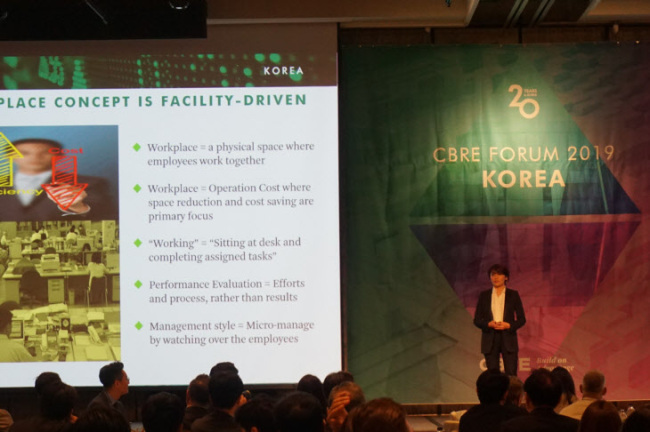Co-working space to keep up strong growth in downtown Seoul: CBRE
World’s largest real estate service provider sees opportunity in office space market
By Bae HyunjungPublished : April 10, 2019 - 15:43
Despite slow gross domestic product growth and weak interest rates throughout the year, as well as the dampening impact on consumer sentiment, South Korea’s market is likely to see visible growth in smarter office space business, according to the world’s largest commercial real estate services firm.
CBRE Korea, the local subsidiary of the US-based real estate service provider, Wednesday held an annual forum to present its market outlook for 2019, focusing on the Asia-Pacific region that includes Korea.
“The supply of new co-working space in Seoul’s key downtown zones exceeded 40,000 square meters as of last year,” said Claire Choi, research head at CBRE Korea, citing the company’s latest survey conducted on executives of some 70 multinational firms.
“The recent market change is especially marked for regional diversification, as many of new co-working space units deviated from the conventional office-clustered Yeouido and Gangnam areas.”
Though co-working space only accounted for 13 percent of respondents’ leasing preference, demand is expected to grow steadily in the near future, the official added.
“While tenant companies are weighed down by slowing exports and increased personnel expenses, landlords have been facing an escalating vacancy rate in recent years,” Choi said.
The persisting supply-demand gap will push the real estate market to further expand the co-working space business, especially in Seoul where the proportion of such offices is relatively low in contrast to peer cities, she added.
CBRE Korea, the local subsidiary of the US-based real estate service provider, Wednesday held an annual forum to present its market outlook for 2019, focusing on the Asia-Pacific region that includes Korea.
“The supply of new co-working space in Seoul’s key downtown zones exceeded 40,000 square meters as of last year,” said Claire Choi, research head at CBRE Korea, citing the company’s latest survey conducted on executives of some 70 multinational firms.
“The recent market change is especially marked for regional diversification, as many of new co-working space units deviated from the conventional office-clustered Yeouido and Gangnam areas.”
Though co-working space only accounted for 13 percent of respondents’ leasing preference, demand is expected to grow steadily in the near future, the official added.
“While tenant companies are weighed down by slowing exports and increased personnel expenses, landlords have been facing an escalating vacancy rate in recent years,” Choi said.
The persisting supply-demand gap will push the real estate market to further expand the co-working space business, especially in Seoul where the proportion of such offices is relatively low in contrast to peer cities, she added.

Chinatsu Kaneko, head of workplace strategy for CBRE North Asia, urged both employers and landlords to change their conventional perception of office space, underlining the concept of activity-based working space, or ABW.
“We traditionally picture offices as physical, cost-driven space with desks and other hardware,” the strategist said.
“Under this notion, however, work is considered as the act of sitting at a desk and completing assigned tasks, which eventually means that performance evaluation is also reliant on efforts and process, rather than results.”
The shift of paradigm in physical office space will not merely affect leasing and management costs, but also remodel the operating methods and the employees’ way of thinking, she explained.
As for concerns on the slowing global economy and the consequent impact on Korea’s local market, CBRE experts were affirmative.
“It is true that the supply-demand gap is likely to widen this year, further pushing up the average vacancy rate, but overseas buyers are still optimistic towards (assets in) Seoul,” said Henry Chin, research head for the Asia-Pacific, Europe, Middle East and Africa.
The geopolitical factor, which has consistently devalued the market here, will not be a key factor either, according to Chin.
“What brings an end to the 10-year cycle of economic expansion won’t be geopolitics. In fact, the employment statistics in G-7 countries show that (the key variable) is all about interest rates.”
By Bae Hyun-jung (tellme@heraldcorp.com)


![[Exclusive] Korean military set to ban iPhones over 'security' concerns](http://res.heraldm.com/phpwas/restmb_idxmake.php?idx=644&simg=/content/image/2024/04/23/20240423050599_0.jpg&u=20240423183955)




![[Herald Interview] 'Amid aging population, Korea to invite more young professionals from overseas'](http://res.heraldm.com/phpwas/restmb_idxmake.php?idx=644&simg=/content/image/2024/04/24/20240424050844_0.jpg&u=20240424200058)

![[Pressure points] Leggings in public: Fashion statement or social faux pas?](http://res.heraldm.com/phpwas/restmb_idxmake.php?idx=644&simg=/content/image/2024/04/23/20240423050669_0.jpg&u=)








